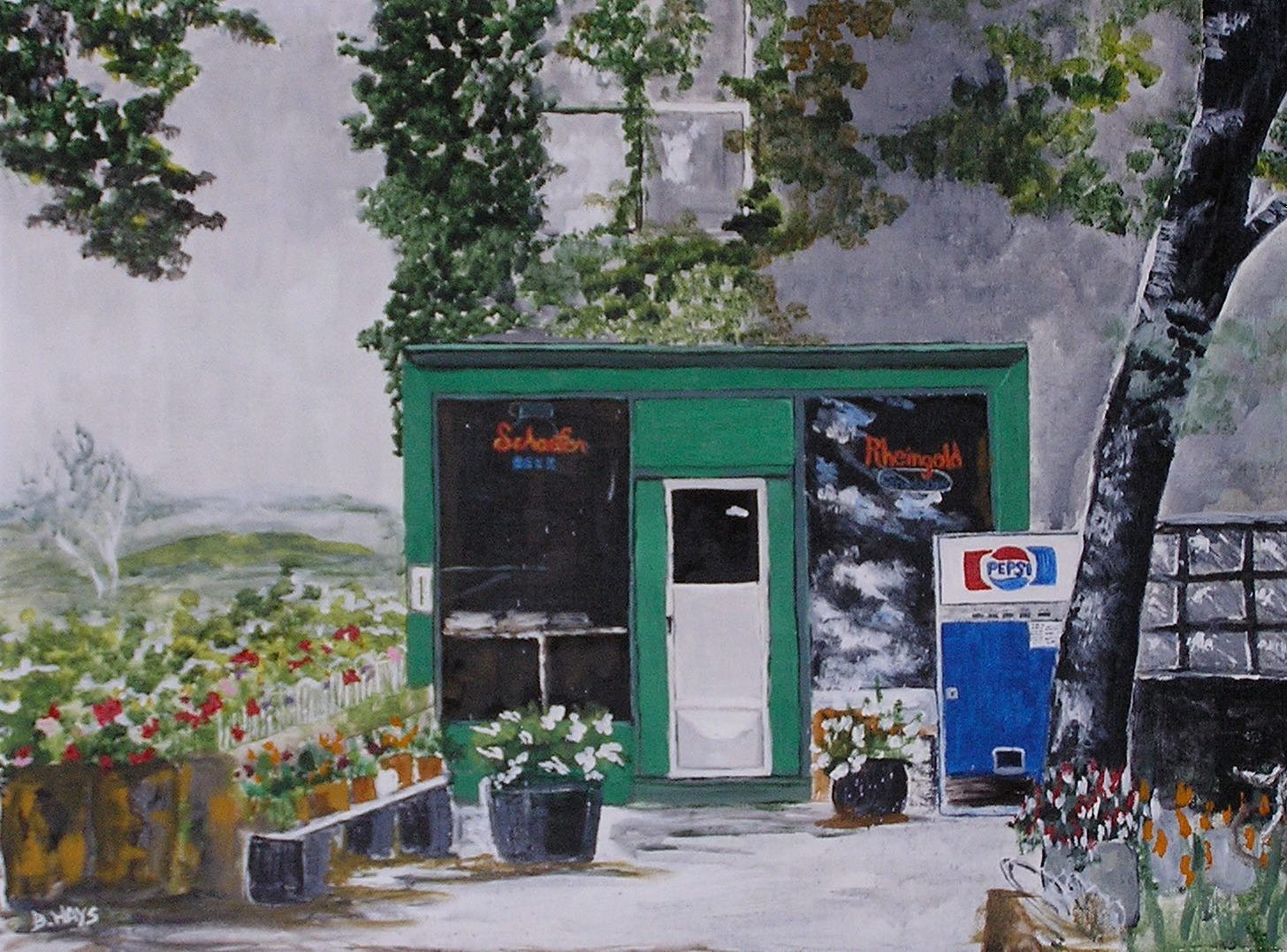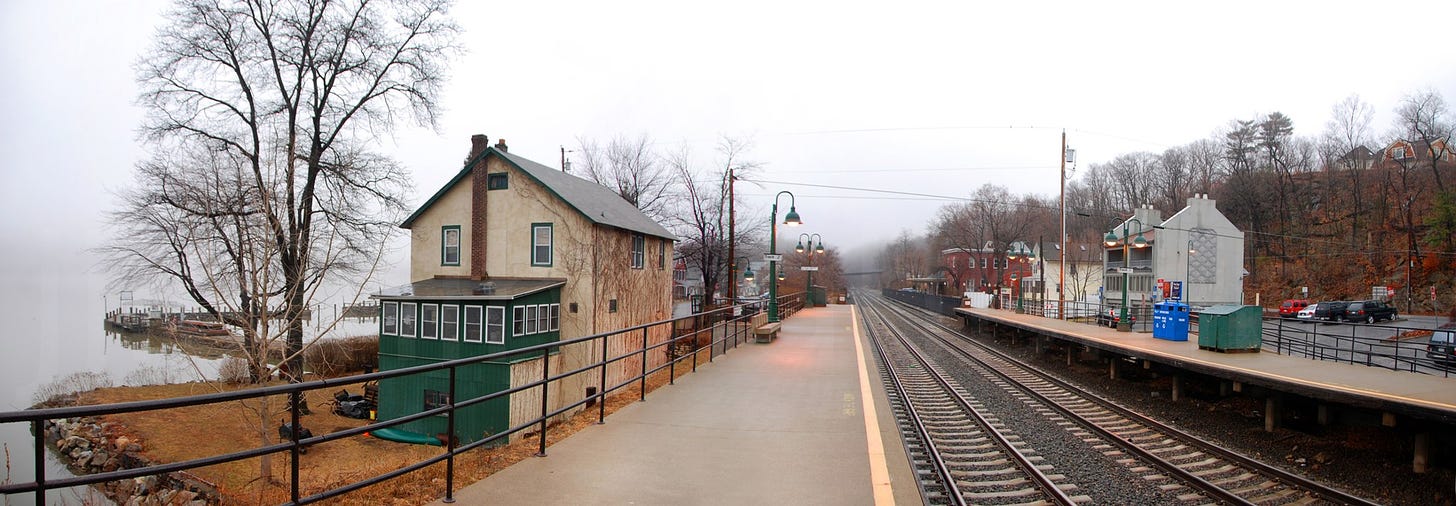Warmup
As the Nov. 5 election approaches, I long for the banter of two guys named Fitz and Dan.
These men were fixtures at an Irish watering hole and country store named Guinan’s nestled in New York’s Hudson Valley. Fitz was a tough-talking, conservative Vietnam veteran. Dan, a liberal lawyer. They disagreed on most things politics and did so with pleasure over beer and ten-ounce Pepsi Colas.
But they agreed on one thing: each would always have the other’s back when the chips were down.
An old rendering of Guinan’s Pub & Country Store. Artist: Betsy Hays Gatti
I first stumbled upon Guinan’s after the terrorist attacks of 2001. My downtown Manhattan apartment across the street from the World Trade Center Towers was closed from damage. I’d been in the shower that morning when the first plane hit. It was last shower I’d ever take there.
At the time I stepped foot in the joint, I was without a home, carrying clothes given to me by friends in plastic bags and relying on the generosity of their couches, spare bedrooms, and kitchens.
One of them was a colleague of mine at The Wall Street Journal who lived near Garrison, New York — a hamlet on the Hudson River just across from the U.S. Military Academy at West Point.
On Nov. 1, 2001 his wife dropped me off at the train depot there to head back to New York City to start looking for new apartments. Before I boarded, she coaxed me into Guinan’s — which sat snug against the tracks.
“Trust me,” she said, already moving toward the door of an ivy-cloaked stucco house. “You gotta see this place.”
What transpired next, changed my life. Ten days later, I moved to Garrison.
Post
Today’s newsletter is a collaboration with Michael Easter, founder of the 2% Substack community and author of several books that have helped me and many others live better.
I met Michael in April when I attended an important gathering he put together in the Las Vegas desert called “Don’t Die” — which taught a small group of us survival skills critical for the modern age.
Almost 20 years prior to Don’t Die, I’d published my book Little Chapel on the River: A Pub, A Town and the Search for What Matters Most. That story fully captures what transpired after I walked through the front door of Guinan’s.
Michael’s mom, it turns out, had read Little Chapel when it first came out and dragged her son to the Hudson Valley to find Guinan’s.
She doesn’t even drink alcohol, Michael says.
What mattered to her — and what saved me at a time when I was profoundly lost — was the community that once thrived in those walls.
Michael read Little Chapel and then reached out and asked a bunch of thoughtful questions about the risks of losing places like Guinan’s — which are fast disappearing from the American landscape, replaced by big chains and digital gathering forums.
We decided to dig deeper. You can watch our conversation in the video at the top of the newsletter. Or listen to it in full below or at Michael’s post about this topic.
A photo of the “Little Chapel” (aka Guinan’s) from the Metro-North train tracks. Courtesy: Russ Cusick.
Now back to Fitz and Dan.
There was a central understanding that at Guinan’s, one’s behavior was subject to the proprietor’s rules. That proprietor was Jim Guinan, and he was the high priest of this chapel, which literally abutted his kitchen and the home where he’d raised four children with his wife Peg.
The code of conduct was unwritten, but here’s a flavor:
You could disagree, but if your language turned rough you had to deal with Peg.
News rarely blared from the old TV hanging in the corner — unless something extraordinary was happening.
If the bartender, Jane, was busy then patrons helped out behind the bar or made sandwiches. I called this “human duct tape.”
Nothing stronger than beer was allowed, except on St. Patrick’s Day when a few shots of Tullamore Dew were dispensed by Jim.
Supper was often offered to those who had nowhere to be.
When major events unfolded, such as the Sept. 11, 2001 attacks or the death of someone in town, Guinan’s was where you came to find out information, grieve and remember.
Here inside these walls, you would always be safe.
Spending time at Guinan’s pulled me off a precipice of fear and despair that had crept into my days after those attacks. The people on the worn, green leather barstools became my family too, and I relied on them to feel whole again. They made me believe in the good of humanity.
Guinan’s is now closed. Michael’s newsletter today is chock full of data supporting the external crisis we face with the disappearance of these “third places,” a term popularized by the late author Ray Oldenburg in his book “The Great Good Place.”
I feel that crisis acutely leading up to the election. Digital forums have a lot of positive attributes. But one thing that’s often missing is the power of face-to-face interactions to act as a stabilizing governor to behavior.
It’s a lot easier to slip into vitriolic rhetoric when you’re staring at a screen than when you’re staring in the actual face of your neighbor whose children play with your own.
Yet digital cowardice is becoming an epidemic — and its harms are widespread.
The latest World Happiness Report came out earlier this year, and the United States (23rd) has fallen out of the top 20 for the first time since the report was published. This was driven by a large drop in the wellbeing of Americans under 30.
Many factors are clearly at play. But I’d place a bet that somewhere in the mix is the retreat to screens and disappearance of physical third places where civility and respect were core tenants of how we treat each other.
And on that point, I bet Fitz and Dan would agree.
Cooldown
There’s a new book coming out in 2025 called The Great Good Place: Havens and Hangouts at the Heart of Community.
Written by fellow Substack author, Karen Christensen, it will explore how third places – cafes, diners, coffee shops, tea parlors, hair salons, barber shops, pubs and taverns, taquerias, libraries, bookshops, and street corners – have a vital role to play in solving the big challenges of climate change, loneliness, and political polarization.
Meantime, my call to action for us is this:
Support your local third places. Spend your money with them. Put down your phone when you’re there. Have conversations with people, particularly people you don’t necessarily agree with, and look them in the eye.
When you’re hanging out in an online “third place,” abide by Guinan’s House Rules. Don’t shout. Don’t curse. Don’t threaten. Be patient. Listen. Learn. Have someone’s back.
That’s it. Pretty simple.
Thank you, Michael, for suggesting we do this. You’d have fit right in at Guinan’s. As always, find something (or somewhere) you love. Dig in. Stick with it when things get hard.
Wendy






The health benefits of having a 'third place'